System of Care
North Carolina's System of Care is a model of organizing services for children and youth who are struggling with emotional, behavioral or mental health issues. It helps families who are working with multiple agencies, like social services, schools, foster care or juvenile justice.
This page explains the ideas behind System of Care. If you need to find services for your child or young person, please contact our customer service team for assistance.
System of Care isn't a single program. It's a team-based approach that puts families at the center of care. It brings everyone together — family members, doctors, teachers, social workers — to create support that is driven by the family's unique needs and goals.
North Carolina was one of the first states to start using this family-centered approach. Today, a federal grant is helping the state to expand and strengthen the system.
Join Your Local Community Collaborative
Community Collaboratives are local groups that focus on the mental health of children and youth. They are part of North Carolina's System of Care.
Join the collaborative near you. You'll become part of a trusted circle of families, young people, caregivers, providers, agencies and advocates. You'll work together toward the same goal: a system where no one has to navigate life alone.
Parts of a System of Care
To make sure our services are helpful and supportive, we follow these core values:
- Interagency Collaboration: Different groups (like schools, health care, social services and community organizations) work as a team.
- Data-driven and Accountable: We use data to see what works and hold ourselves accountable for good results.
- Individualized, Strength-Based Approach: Care is designed around the child’s unique strengths and needs.
- Family-driven and Youth-guided: Families and young people have a voice. They are part of the decisions made for the care of the child and family.
- Culturally and Linguistically Responsive: Services respect the family’s culture, background, and language.
- Home and Community-Based Services and Supports: Services are provided in places that are comfortable and familiar, like your home, school, or neighborhood.
- Trauma-informed Care/Evidenced Based Practices: Understanding the effects of trauma and using care methods that are proven to work.
An important part of System of Care is the Child and Family Team. This is a group of people the family chooses to help make decisions about a child's care. Here's what makes these teams special:
- The family is the center of the team, which can include doctors, teachers, social workers, friends and anyone else involved in the child's life.
- Trained Family Partners and Youth Partners can join the team. They have lived experience and can advocate for the family and child.
- The team meets regularly. The family can decide who they would like to have attend.
- The team comes up with, and then follows, a plan that covers school, health and other parts of the child's life.
- The meetings are designed to make sure the voices of children, youth and families are included in the decision making process.
- The team helps see the things the family does well and uses those strengths to help the child succeed. They are respectful of the family's cultural background, beliefs and language.
- Everyone agrees to share responsibility and do their part — including state agencies, community partners and the family.
- If something isn't working, the plan can change.
- A trained facilitator helps build the team and lead the meetings until the child or family is ready to take over.
Training
- The NC High Fidelity Wraparound Training Program trains the coaches and facilitators that run Child and Family Teams in North Carolina.
- The NC Collaborative for Children, Youth & Families offers training for families and professionals on how to effectively participate in and lead Child and Family Teams.
Family and Youth Partners are people who have been through similar challenges themselves. Their "lived experience" gives them special expertise and knowledge. They are trained to help and support families and youth.
A Family Partner is someone who has raised a child with similar challenges. A Family Partner often helps by:
- Sharing what they've learned from their own experience.
- Guiding families and youth through the system to get the services they need.
- Helping families and youth prepare for their System of Care meetings, and support them while they're there.
- Improving communication between the family and different agencies.
- Acting as a trusted source of information and help, especially during hard times.
A Youth (or Young Adult Peer Support) Partner is a young person (ages 16-25) who has gone through similar experiences. They offer many of the same supports as a Family Partner, but from a young person's point of view. A Youth Partner often helps by:
- Making a child or youth feel heard and supported.
- Encouraging a child or youth to take an active role in their care.
- Showing a child or youth that they can be a leader.
- Acting as trusted source of information and help, especially during hard times.
Become a Family or Youth Partner
NC Youth & Family Voices Amplified offers training, certification and support to Family Partners and Youth Peer Support Providers.
Community Collaboratives are local groups who meet regularly and support their local System of Care. They include families, schools, doctors, public agencies, community leaders, faith-based organizations, and more.
Each Community Collaborative is supported by a trained System of Care coordinator, who can advocate on their behalf.
Find a Community Collaborative
The North Carolina Collaborative for Children, Youth & Families is a state-level group that works with each Community Collaborative, and advocates at the state level.
Training and Webinars
- System of Care Webinar (2023): an introduction to System of Care for providers and partners. Watch Part 1 | Part 2
- Child and Family Team Training: Learn to effectively participate in and lead Child and Family Teams. Offered by the NC Collaborative for Children, Youth & Families.
- High Fidelity Wraparound Training: Prepares coaches and facilitators of High Fidelity Wraparound teams. Offered by the NC High Fidelity Wraparound Training Program.
- Family and Youth Peer Support Training: NC Youth & Family Voices Amplified offers training, certification and support to become a Family Partners or Youth Peer Support Provider.
Toolkit: Flyer, Rack Card, Stickers, Social Media
Use these free materials to spread the word about North Carolina's System of Care and Community Collaboratives.
| Preview Image | Description and Download Link |
|---|---|
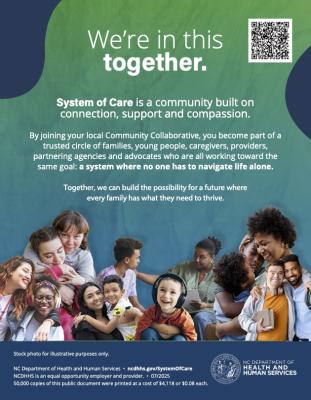
| “We're in this together” Flyer - English/Spanish (PDF) Letter size (8.5 inches by 11 inches) |
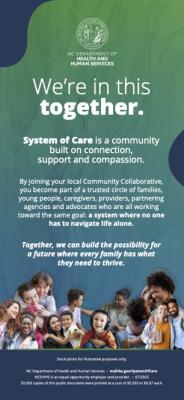
| “We're in this together” Rack Card - English/Spanish (PDF) 4 inches by 9 inches |
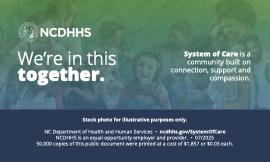
| “We're in this together” Wallet Card - English/Spanish (PDF) 2.25 inches by 3.75 inches |
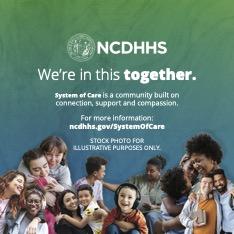
| “We're in this together” Sticker - English (PDF) “We're in this together” Sticker - Spanish (PDF) 3 inches by 3 inches |
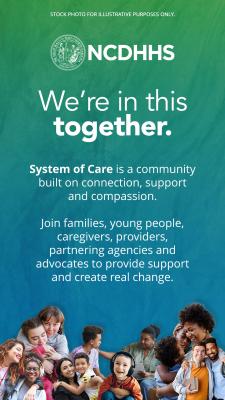
| “We're in this together” Social Media Toolkit - English/Spanish (ZIP Archive) Social media graphics and suggested text |
Contact Us
Our team is here to support local collaboratives and ensure our values are put into practice across the state. We are:
- Stacie Forrest, SAMHSA System of Care High Fidelity Wraparound Expansion Grant Project Director; Child Behavioral Health Unit Manager; LCMHC
- Hayley Bayne, NC System of Care Team Lead & Strategy and Impact Coordinator
- Teka Dempson, Lead Family Coordinator for SAMHSA SOC-HFW Expansion Grant
- Sharonda Thomas Bulluck, Lead Collaborative Coordinator
- Tara Waters, Outreach Coordinator
